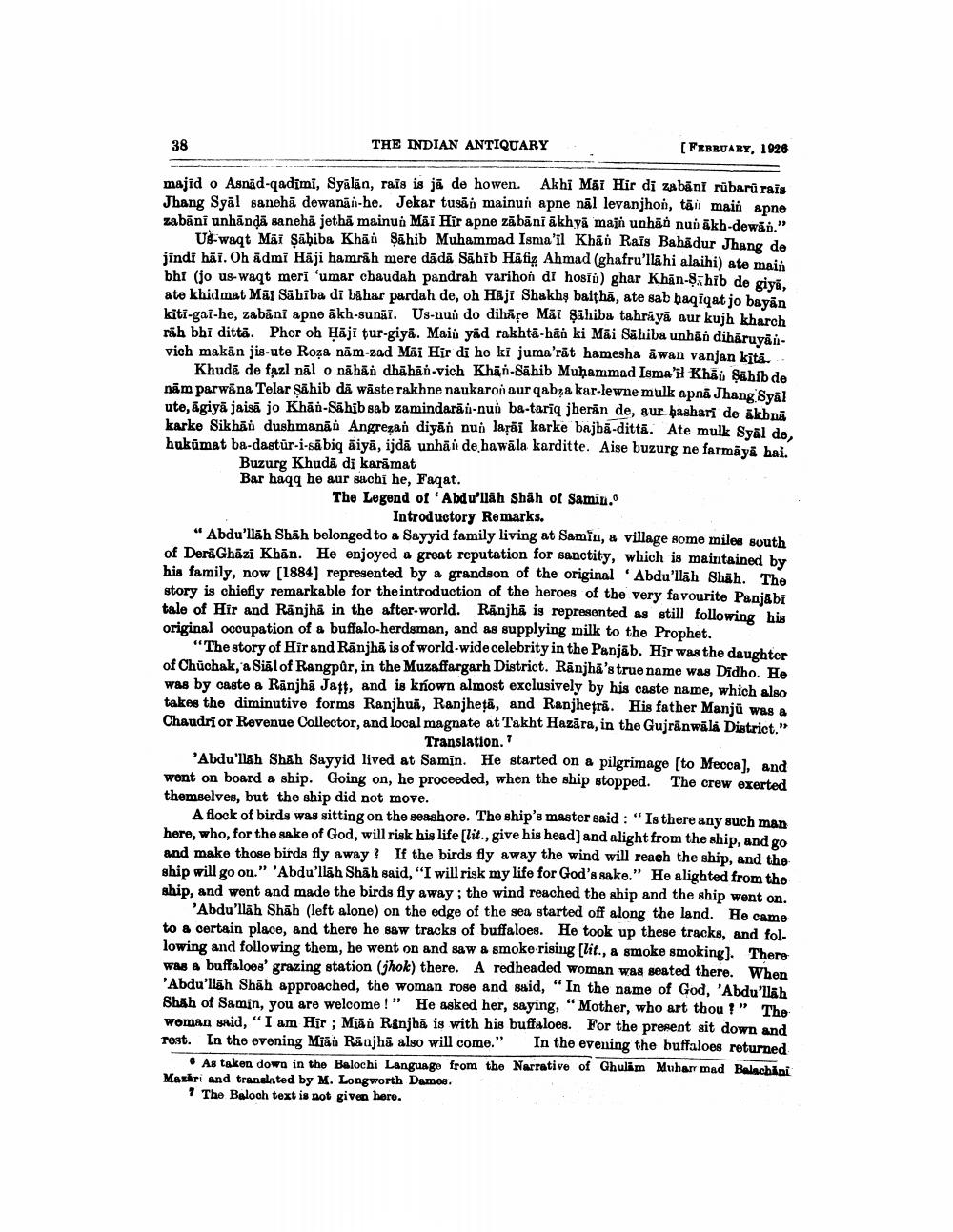________________
THE INDIAN ANTIQUARY
[ FEBBUARY, 1926
majid o Asnād-qadimi, Syālān, rais is jā de howen. Akhi Mãi Hir di zabāni rübaru rais Jhang Syal sanehā dewanar-he. Jekar tusān mainui apne näl levanjhon, tā main apne zabāni unhānda sanehā jethā mainu, Mãi Hir apne zābāni ākhyā main unhāò nun ākh-dewão."
Uh-waqt Mãi Şahiba Khān şahib Muhammad Isma'il Khāń Rais Bahadur Jhang de jindi här. Oh admi Hāji hamrāh mere dādā Sāhib Häfix Ahmad (ghafru'llāhi alaihi) ate main bhi (jo us-waqt meri 'umar chaudah pandrah varihon di hosió) ghar Khan-sahib de giya. ate khidmat Mai Sābiba di bahar pardah de, oh Hāji Shakh baithā, ate sab baqiqat jo bavân kiti-gai-he, zabāni apne ākh-sunai. Us-nuú do dihāṣe Mãi Şahiba tabrayā aur kujh kharch rih bhi dittă. Pher oh Hāji tur-giya. Main yâd rakhtā-hãn ki Māi Sāhiba unhān diharuvai vich makan jis-ute Roza nām-zad Mãi Hir di he ki juma'rāt hamesha iwan vanjan kita.
Khuda de fazl nal o nāhān dhähāó-vich Khān-Sahib Muhammad Isma'il Khai Sahib de näm parwāna Telar Şahib dā wāste rakhne naukaron aur qabya kar-lewne mulk apna Jhang Sval ute, agiyä jaisā jo Khān-Sāhib sab zamindarāi-nuó ba tariq jheran de, aur bashari de akbni karke Sikhân dushmanāó Angrezan diyān nu; laçãi karke bajbā-dittā. Ate mulk Syal de hukumat ba-dastür-i-sābiq äiyā, ijdā unhāi de hawāla karditte. Aise buzurg ne farmaya hai.
Buzurg Khudā di karimat Bar haqq he aur sachi he, Faqat.
The Legend of 'Abdu'llāh Shah of Samin.
Introductory Remarks. "Abdu'lláh Shah belonged to a Sayyid family living at Samin, a village some miles south of Deri Ghazi Khan. He enjoyed a great reputation for sanctity, which is maintained by his family, now (1884) represented by a grandson of the original Abdu'llāh Shah. The story is chiefly remarkable for the introduction of the heroes of the very favourite Panjabi tale of Hir and Ranjha in the after-world. Ranjha is represented as still following his original occupation of a buffalo-herdsman, and as supplying milk to the Prophet.
"The story of Hir and Ranjhā is of world-wide celebrity in the Panjab. Hir was the daughter of Chuchak, a Silof Rangpûr, in the Muzaffargarh District. Ranjhā's true name was Didho. He was by caste a Ranjha Jatt, and is known almost exclusively by his caste name, which also takes the diminutive forms Ranjhua, Ranjhețā, and Ranjhefra. His father Manju was a Chaudrior Revenue Collector, and local magnate at Takht Hazāra, in the Gujranwäla District."
Translation.' Abdu'llah Shah Sayyid lived at Samin. He started on a pilgrimage [to Mecca), and went on board a ship. Going on, he proceeded, when the ship stopped. The crew exerted themselves, but the ship did not move.
A flock of birds was sitting on the seashore. The ship's master said: "Is there any such man here, who, for the sake of God, will risk his life [lit., give his head) and alight from the ship, and go and make those birds fly away? If the birds fly away the wind will reach the ship, and the ship will go on." 'Abdu'llāh Shāh said, "I will risk my life for God's sake." He alighted from the ship, and went and made the birds fly away; the wind reached the ship and the ship went on.
'Abdu'llāh Shāh (left alone) on the edge of the sea started off along the land. He came to a certain place, and there he saw tracks of buffaloes. He took up these tracks, and following and following them, he went on and saw a smoke rising [lit., a smoke smoking). There was a buffaloes' grazing station (jhok) there. A redheaded woman was seated there. When 'Abdu'llāh Shah approached, the woman rose and said, “In the name of God, 'Abdu'llah Shah of Samin, you are welcome!” He asked her, saying, "Mother, who art thou!" The woman said, "I am Hir; Mjās R&njhā is with his buffaloes. For the present sit down and rest. In the evening Mjāi Ranjhā also will come." In the evening the buffaloes returned
. As taken down in the Balochi Language from the Narrative of Ghulam Muharr mad Balachini Mashri and translated by M. Longworth Domes.
1 The Baloch text is not given here.




